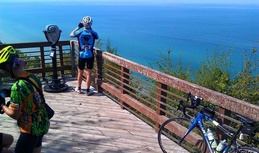The Real Estate {Power} Brokers
April 26, 2015

A roundtable chat about what’s happening in the local market
Wally Kidd

Kidd & Leavy, Petoskey Broker, Co-Owner
Three locations in Emmet, Charlevoix and Antrim counties
"My partner and I started in 2003. Though we do a lot of primary homes, our bread and butter is the second home market."
Bob Brick
RE/MAX Bayshore Properties, TC Broker-Owner
Four offices, concentrated on Northwest Michigan
"I’ve been selling real estate for 42 years. 4000 properties and 65,000 showings. I joke that I might not know where you live, but I’ve probably been in your house."
Mike Schmidt
Coldwell Banker Schmidt, TC President, Broker, Co-Owner
65 offices; operate 44 in Michigan; 1,200 agents
Fourth generation realtor; great grandfather started the company in 1927
"I basically spent my whole life in real estate, starting out doing mailers and catalogs as a kid. It hasn’t changed much other than I get paid!"
Dennis Pearsall
Real Estate One, TC President of NW Michigan Division and leader of Franchising Division
75 offices in Michigan...third generation family-owned business
"Our company did $4.4 billion in sales last year. I’ve been up here in Traverse City since 2008, and we have ten offices in northwest Michigan."
Brad Platt
Century 21 Northland, TC Broker, Co-Owner
Just opened ninth office in the five county area
"We started our company in 2006, right before the cool-down and the crash. We now also own a property management company and a vacation rental company."

Northern Express brought some of the region’s top real estate broker-owners together for a talk about what’s selling, what’s changing, and why. The lone female of the group, Holly Hack of EXIT Realty Paramount, had a last-minute scheduling conflict [though we checked in with her after; see page 20]
Before sitting down, the conversation among competitors -- whom together are responsible for billions in real estate sales each year -- talked casually about their record April sales and upcoming closings. RE/MAX Bayshore’s Bob Brick told stories about how, as a child, he used to run around and play in what’s now the historic Wellington Inn B&B in Traverse City where the group gathered. Soon conversation settled into business...
EXPRESS: So let’s talk about this red-hot market right now.
SCHMIDT: I think it’s balanced right now. We’ve had a pretty big rebound from those lows of 2009 and some nice, steady growth. But I think 2014 was more of a leveling year. The pace slowed down a little. It feels more balanced.
PLATT: It’s a healthy market for sure. Some nice appreciation in values. We’d sure like to maintain that.
PEARSALL: It’s healthy, but not in all the troughs. We’re not seeing a lot of appreciation [of values] on the high-end waterfront homes, for instance.
BRICK: I think that’s in part because there are fewer people at the top. I just think Traverse City in particular is poised to be fantastic from a realtor’s perspective. It has gotten so many accolades and articles by travel writers promoting our area. It’s been discovered, and I think we’re going to see the benefits of that for several years, particularly as a retirement community. There’s good, quality growth and a lot of projects in the works.
PLATT: The bargains don’t seem to be there.
BRICK: The really low interest rates have allowed entry-level buyers to get in. For them it’s about the payment. So the payments can stay low but the prices stay high.
KIDD: I think it’s important to acknowledge the separation between the primary and secondary markets. A primary home everybody needs. Secondary nobody needs.
EXPRESS: Wally, talk about what’s happening up in your market.
KIDD: It’s different in Petoskey than in Traverse City. Inventory is going down and prices are stabilizing for sure. We suffered with the downturn...oh yeah. But I was surprised we didn’t see more foreclosures at the high end. We really didn’t. And now we’re seeing a disproportionate amount of customers paying cash in the secondary market again.
BRICK: One out of every five homes sold is a vacation home, and there’s big growth in that market right now.
KIDD: The secondary market has the auto industry downstate helping it. People are buying the second homes and cottages they want. Petoskey doesn’t have Lowes or Home Depot because you don’t see as many people looking to remodel old homes downtown."
BRICK: Isn’t the driver still the over-60 population?
PEARSALL: It still is for sure.

KIDD: Our average age buyer of vacation homes is down significantly, actually. It used to be 60 but it’s quite a bit lower now.
SCHMIDT: You can see the younger professional crowd on that late flight back to Traverse City on a Thursday or Friday night... young people commuting...working elsewhere but living here.
And even with the retirement age buyers, a lot of those very expensive homes, like $1.5 million and over, are not necessarily bought as investments. They are lifestyle choices. Those couples will choose to just leave less money for their kids and enjoy life now.
EXPRESS: Is there a problem, though? The number of first-time buyers is down significantly and many can’t get qualified for loans under a tighter regulatory environment.
BRICK: It’s usually because that group has poor credit.
SCHMIDT: I think the employment market is shifting. As they get good jobs, they’ll be buying homes just like other generations.
PLATT: Yes, I see the millennials renting in a downtown but eventually becoming buyers somewhere. And as for getting people approved, I think it’s back now where it used to be, really.
SCHMIDT: I agree. It’s about where it should be with credit scores.
BRICK: They have to be squeaky clean, though.

PEARSALL: The process, the paperwork... it’s voluminous these days, and on August 1 [when new regulations go into effect] it’s going to be even more challenging. You put that together with the lifestyles and rental mentality of millennials and the question I have is, will that shift to more of the "new normal?" Either they’ll eventually become buyers or will they gravitate to their lifestyles, choose to rent and spend that money elsewhere, like travel?
PLATT: August will be an interesting month, big time.
PEARSALL: I think Bob’s right about the local market, but nationally home ownership is as low as it’s been in 20 years. If we’re poised for a shift, great, but in Benzie and Antrim and Bellaire, there is some problematic stuff. So yes, we’re in a hot pocket here, but there are exceptions.
EXPRESS: What about affordable housing?
BRICK: It doesn’t exist. Not without subsidies. It’s very difficult to build affordably to the new regulations and standards and with high taxes.
SCHMIDT: And the high building costs.
PLATT: And the risk...
KIDD: We’re working on a deal in Boyne City, and when you look at the workforce it takes to sustain a town...the waiters, clerks, servers...that’s a problem. They can’t afford to even rent in many towns. The only way we could make the Boyne project work was with grants and subsidies.
EXPRESS: So a local government can make a difference?
KIDD: In Boyne City, the group running things does a great job. They’re a very willing government body that wants to do what’s right, and we have a great developer who’s earned their trust.
PEARSALL: Your comment on Boyne City is so classic; they’ve embraced the growth and look what a job they’ve done. Then look at downtown Charlevoix.
KIDD: I can’t believe the open retail spaces. There are a lot of smart people in that town. I don’t understand it
EXPRESS: Talk about what’s hot right now.
SCHMIDT: Anything in town is hot. Also anything on the water that’s appropriately priced.
BRICK: New builds are just beginning to crawl out of a hole, too. Of course now a labor shortage is very real for builders and subcontractors. But I also think Leelanau County is strong, with a number of sales and good average prices.
PEARSALL: Would you agree that price-wise we’re sort of back where we were before the bad years?
BRICK: Yes. Prices went down about 28 percent, so we’re right about back there.
PLATT: Yes, back to about 2006 numbers, I’d say.
EXPRESS: You’re the experts. What are some tips you’d have for buyers or sellers right now?
PLATT: If you’re a buyer, be ready to pull the trigger. Things are selling so fast now that you’ll usually see a buyer get burned a few times before they learn that.
PEARSALL: I’d say to a seller, make sure it’s priced at the market, or if you’re really motivated, even ahead of the market. Price it where it needs to be to sell.
KIDD: We deal with that a lot. They say they want to sell their house, but then there are ten others at their price point, so you have to consider inventory. Motivation is so huge for sellers; we sometimes have sellers who are not in a hurry.
BRICK: My advice is to buy the best house you can afford and stay in it as long as you can. Interest rates are so low. The difference between a $130,000 house and a $160,000 house is $30,000, but only $1,000 a year in payments.
PLATT: That’s a good lesson.
PEARSALL: I also think be ready to buy it. Don’t diddle with $1,000. Pay what it’s listed at if you really like the house.
KIDD: Yes. Always.
PLATT: Full price or higher, in this market.
SCHMIDT: That’s very true, but I recall buying a house in town years ago and we lost it, and my grandpa saying, "there’s always another one." Low and behold, my next dream house came along. A home is not a commodity; every home is a little different.
PEARSALL: I’d also like to bring up our industry itself. I think our impact is profound and not widely enough known. Our work makes up almost 20 percent of the entire economy of this country. It’s a noble business we’re in. I recall right after 9/11, if it hadn’t been for a strong real estate market, this country would have been in the tank.
KIDD: That’s a fact.
Trending

Big Bear Butt Cruise to Ride Aug. 23
If you suddenly see a bunch of bikes, bears, or big butts around Manistee and Benzie counties this Saturday, never fear&mdas… Read More >>
Food, Wine, and...Highland Cows?
The inaugural Traverse City Food & Wine festival runs Aug. 20-24, and while events are selling out quickly, here’s… Read More >>
40 Women Over 40: A Photo Series
They say age is just a number. But when the big 4-0 started creeping around the corner, Traverse City photographer Jamie Kir… Read More >>


